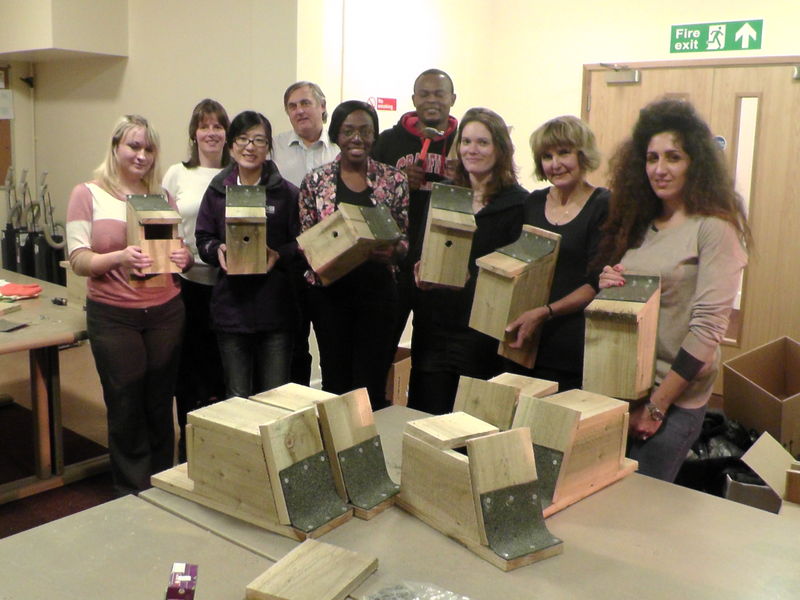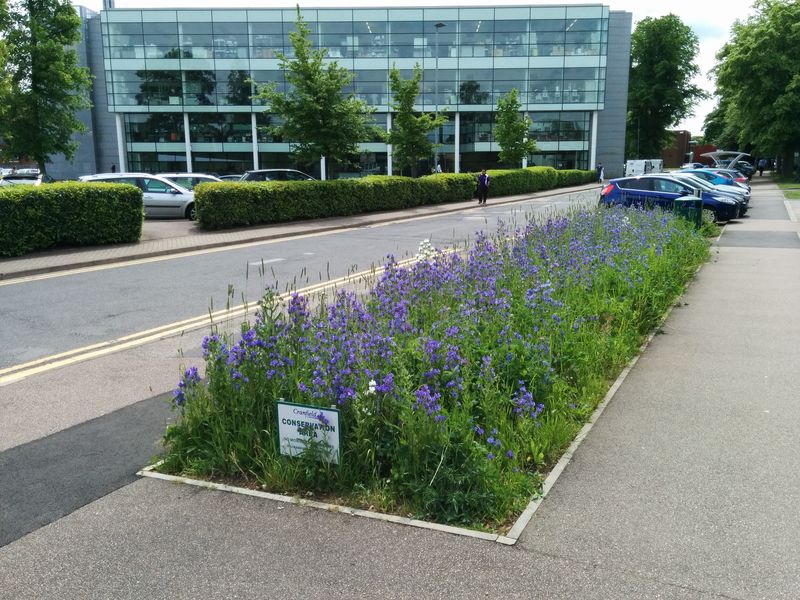Cranfield University
As a research intensive, wholly post-graduate University, with its own sewage works and airport, Cranfield has a diverse range of challenges to address to meet carbon reduction and environmental improvement objectives.
Cranfield is committed to ‘practising what we teach’ and has established a number of measures to improve our sustainability.
Our Environmental Management System Continuous Improvement
-
Over the past 5 years, we have made a real effort to improve sustainability at Cranfield University. In November 2013, we won a ‘Highly Commended Green Gown Award’ in the ‘Continuous Improvement: Institutional Change’ for our work. As part of our application, we created a short video titled ‘Cranfield Green - Practising what we teach’.
-
In 2013, our main campus was awarded certification to the International Environmental Management System (EMS) Standard ISO 14001. This environmental management system provides the framework for setting and achieving the University's environmental objectives; managing and reducing the impact of our environmental incidents to prevent pollution and ensuring we are compliant with applicable environmental legislation and other key requirements.
-
What’s next? We are now looking to extend the EMS certification to include Cranfield Defence and Security activities taking place at the Shrivenham and COTEC campuses. We are in the process of developing further the capabilities of Green Teams on campus. This includes introducing focused workshops and activities, alongside volunteering events such as energy saving, recycling and conservation work.
Energy reduction and infrastructure
-
In 2007/8 Cranfield’s carbon emissions peaked at over 20,000 tonnes and a detailed carbon management plan was developed to start proactively reducing these with a 50% reduction in emissions target set to achieve by 2020. So far we have reduced our carbon emissions by 20% from a 2005 baseline. This has been achieved by investments in CHP and District Heating infrastructure and improving efficiencies in lighting and IT, upgrading buildings and improving space utilisation. In April 2013, we secured a HEFCE loan to invest in a 1MW Biomass Boiler. This is now running efficiently on campus.
-
Since 2010, Cranfield has worked with Zapcarbon to engage staff and students in energy saving campaigns including annual Winter Carbon Savings competitions and Christmas shutdown Contests. In November 2014, Cranfield and Zapcarbon won a joint award in the ‘Behaviour change and Engagement’ category at the Energy Awards for saving approx. £170,000 in electricity through our behaviour change initiatives. More information.
-
Our annual student intake is proactively involved in Student Switch Off campaigns and recycling initiatives in on-site accommodation.
-
What’s next? Continued investments will be made in energy efficiency via Salix Loans. Also, progress will be made on large energy projects such as further improving the district heating system and proposals for a large solar PV array.
Improving transport links
-
In 2013, Cranfield joined forces with UNO bus company to provide efficient and cost effective transport links from our surrounding towns and villages. Staff and students can use the bus for £2 a return. Currently the UNO Cranfield Connect bus service is used on average by over 500 passengers a day.
-
The University has worked with Central Bedfordshire Council and Sustrans to complete a cycle path connecting Cranfield village to the University. This facilitates a safe cycling and walking route for staff and students living in the village to campus. In support of this we have installed various high quality bicycle shelters and hoops in key locations across the campus to encourage cycling.
-
We host regular events to encourage car sharing including ‘Liftshare lunchtime sessions’ which help to increase the number of people signed onto our car share portal. We provide car sharers with priority parking on campus and currently have 300 staff and students registered to the car share scheme.
-
What’s next? We are currently liaising with the local council regarding gaining real time bus timetables and improved bus shelters. We are looking into investing in more shower and locker facilities on campus for cyclists.
Fairtrade
-
Cranfield University successfully gained Fairtrade status in September 2013. We now celebrate Fairtrade Fortnight on annual basis. During this event, we not only promote Fairtrade but help raise funds for our Cranfield based charity SAFAD.
Waste and recycling
-
The University has a target to increase recycling segregated on site by 75% by 2020. So far we recycle 50% of waste on site and this is still increasing! General waste is further sorted at the off-site MRF facility where a further 10-20% of material is recovered for recycling.
-
We have simplified our recycling system from 5 separate recycling bins down to just 3. This makes it easier for staff and students to recycle. We made sure signage and colour coding is consistent throughout. We also rolled out a campaign which urged staff to remove their under-desk bin in exchange for a waste and recycling hub in their office.
-
During 2012, we introduced the ‘Big Cranfield Clearout’ initiative which runs on an annual basis and gives students the option of donating their unwanted items to charity before they vacated the campus. We then organised a group of volunteers who helped to sort these items. Charities we work with include Emmaus, Oxfam, Salvation Army, and local animal shelters including Hula. At the start of the new academic year, we also gave new students the opportunity to buy second hand student clothing and other items from the Emmaus shop.
-
We have recently opened a ‘Recycling Centre’ in conjunction with our Student Association where staff and students have the opportunity to recycle or donate items for reuse from cans to clothes throughout the year.
-
What’s next? Although we do currently carry out a food waste collection on campus, we plan to expand our service on campus and make use of our own experimental anaerobic digestion facility to process some of this waste. We are in the process of upgrading our campus waste yard which will improve facilities for on-site recycling and improve our bin weighing. Finally, we plan to make sure all areas on campus have easy access to a recycling bin.
Biodiversity
-
Where we can, we have taken opportunities to change the grounds management regime in key areas on campus and designate these as ‘Biodiversity Action Areas’. These areas of land are set aside to allow natural grasses and wildflowers to grow and provide food and shelter for bees, butterflies and birds. We currently have 1470m2 set aside and are planning to further increase this.
-
We are planning our second ‘Bioblitz’ event- this will act as our annual count of all flora and fauna on campus. On a more regular basis we host fortnightly biodiversity walks where we explore the beautiful rural surroundings of the campus and raise awareness of wildlife on our doorstep.
-
What’s next? We are looking to introduce our first bee hive on campus - this will not only provide honey but help bees to thrive in the local area. We plan to produce a detailed Biodiversity Action Plan using data from the Bioblitz survey to help detail management regimes which should be in place.
Research, teaching and wider engagement
-
Cranfield aims to ensure all graduates are equipped with the skills, knowledge and experience to make a positive contribution to sustainable development.
-
We are a core partner and one of 12 global universities in the Schmidt-MacArthur Fellowship, an international postgraduate programme on the circular economy for environment, design and business students. The Fellowship was developed in association with the Ellen MacArthur Foundation and Schmidt Family Foundation for postgraduate students to develop the skills and innovative thinking required to map out a more sustainable economy.
-
Cranfield University has joined forces with Herbert Smith Freehills, one of the world’s leading law firms, in sole recognition of bringing science to the city, to create a series of seminars called ‘Science for the Green Economy.’ Launched in 2014, this series aims to create a dynamic community of senior practitioners in global companies, Governments, NGOs, universities, scientific institutions and consulting firms. You can watch Ellen MacArthur’s Prestige Lecture as part of this series focusing on the Circular Economy.
-
Some examples of the impact our research is having to create a more sustainable world include:
-
pioneering new approaches for the generation and sustainable use of energy
-
developing more sustainable transport
-
contributing to policy and legislation on sustainability in sectors ranging from aviation to agriculture
-
developing improved technologies for natural resource management
-
making a significant contribution to reducing food waste, informing better land management, supporting sustainability of food production, novel transportation and storage of foodstuffs.
-
The Doughty Centre for Corporate Responsibility was established in 2007. Its mission is to equip current and future managers across the private, public and voluntary sectors with the skill, confidence and inspiration to place sustainability and responsibility at the heart of how they manage.
-
Cranfield University has previously been awarded ‘Highly Commended’ Green Gown Awards for the ‘Nano Membrane Toilet’ project in 2014 and the ‘Carbon Brainprint’ in 2011.
-
Each year, Cranfield hosts a Green Week event which not only acts to show case these innovative research projects but helps to raise awareness of environmental issues on campus, and encourages behavior change.
Main Contact Name: Gareth Ellis, Energy and Environment Manager
Main Contact Email: [email protected]
Further information/website: www.cranfield.ac.uk/about/governance/environmental-credentials/
Share with us: www.twitter.com/CranfieldGreen















